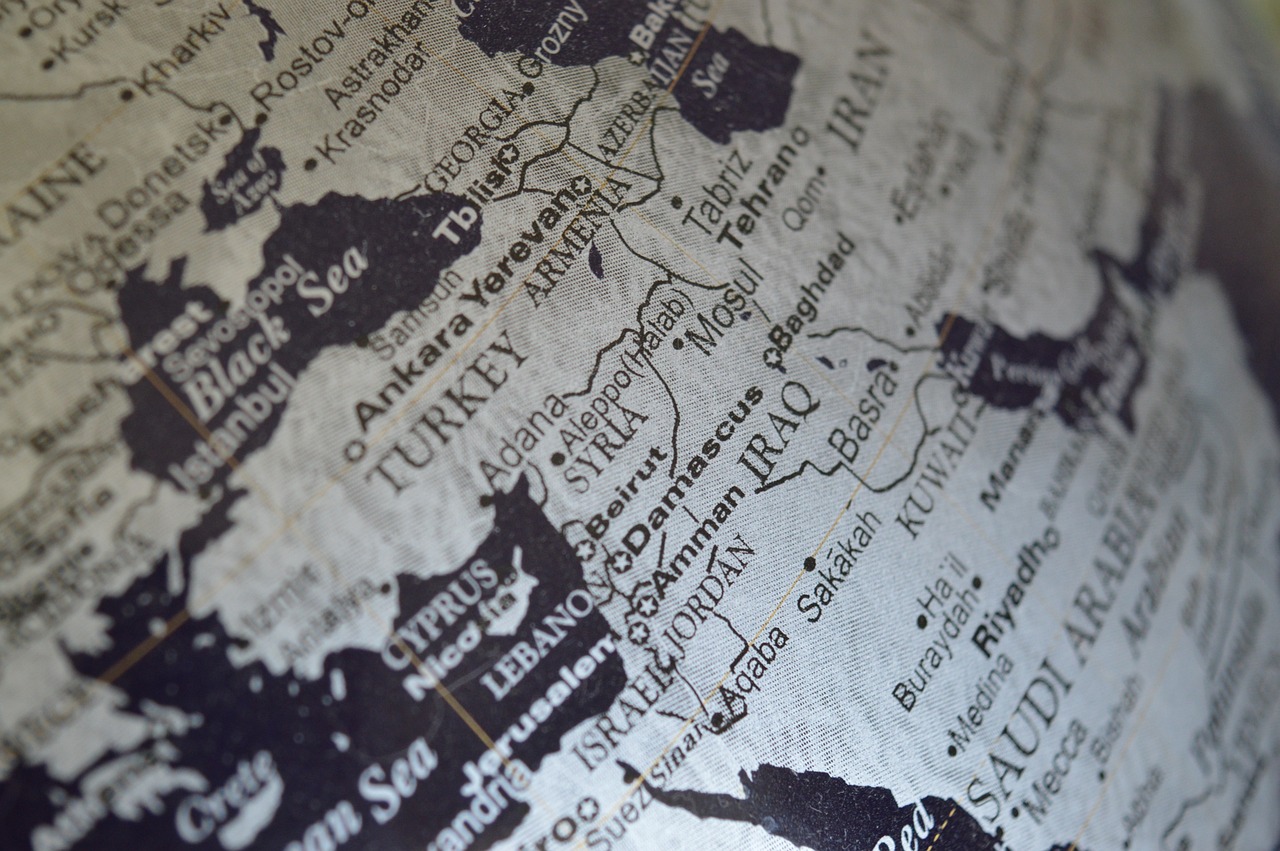Examining the Intersection of Philosophy and Geopolitics
In an age where global dynamics are constantly shifting, understanding the interplay between philosophy and geopolitics is more crucial than ever. The way nations interact on the world stage is not merely a game of power; it is deeply influenced by the underlying philosophical concepts that shape their policies and actions. From ancient thinkers to modern theorists, the ideas that govern our thoughts about ethics, morality, and statecraft are profoundly intertwined with international relations. This article aims to explore how these philosophical frameworks inform geopolitical strategies and how, in turn, geopolitical realities can reshape our understanding of philosophical thought.
At the heart of this exploration lies a fundamental question: How do our beliefs about power and ethics influence our actions on the global stage? Imagine a chess game, where each piece represents a nation, and the board symbolizes the international arena. The rules of the game, influenced by philosophical ideas, dictate how each piece moves and interacts. Just as a chess player must anticipate the opponent's strategies, nations must consider the philosophical implications of their geopolitical maneuvers.
One cannot overlook the historical context in which these ideas have evolved. Thinkers like Machiavelli and Hobbes have laid the groundwork for understanding the motivations behind state actions. Their writings reflect a world where the struggle for power is paramount, and ethics often take a back seat to survival. This historical perspective is essential to grasping the nuances of modern geopolitical thought and the ethical dilemmas that arise from it.
Furthermore, the intersection of philosophy and geopolitics is not merely academic; it has real-world implications. For instance, the rise of nationalism in various parts of the world can be traced back to philosophical notions of identity and belonging. As nations grapple with their place in the global order, philosophical questions about self and other become increasingly relevant. The struggle for national identity, influenced by philosophical ideals, can lead to conflicts that reshape international relations.
In this exploration, we will also delve into how different philosophical schools of thought, such as realism and liberalism, present contrasting views on international relations. Realism, with its focus on power and security, often paints a grim picture of global politics, while liberalism offers a more optimistic outlook that emphasizes cooperation and human rights. These philosophical debates are not just theoretical; they have tangible effects on diplomatic relations and policy decisions.
As we navigate this complex landscape, it is essential to recognize that the dialogue between philosophy and geopolitics is ongoing. The questions we face today may be different from those of the past, but the underlying principles remain the same. By examining this intersection, we can gain a more profound understanding of the forces that shape our world and the ethical considerations that must guide our actions.
- What is the relationship between philosophy and geopolitics?
Philosophy provides the foundational ideas that influence how nations perceive power, ethics, and morality in international relations. Geopolitical strategies are often shaped by these philosophical concepts. - How have historical philosophers impacted modern geopolitics?
Thinkers like Machiavelli and Hobbes have laid the groundwork for understanding state behavior and power dynamics, influencing contemporary geopolitical theories. - What are the ethical implications of realism in international relations?
Realism focuses on power and security, raising questions about morality in foreign policy and the ethical dilemmas faced by states. - How does liberalism differ from realism?
Liberalism emphasizes cooperation, democracy, and human rights, offering a contrasting approach to the often power-centric view of realism.

The Role of Philosophy in Geopolitical Thought
Philosophy serves as the bedrock of geopolitical thought, providing a lens through which nations interpret power dynamics, ethical considerations, and the moral implications of their actions on the global stage. Without the guiding principles of philosophy, geopolitical strategies might resemble a ship lost at sea, lacking direction and purpose. By examining the philosophical frameworks that underpin international relations, we can better understand how nations navigate the complexities of diplomacy, conflict, and collaboration.
At its core, philosophy challenges us to consider the fundamental questions of existence, morality, and the nature of power. For instance, when we think about the concept of power in geopolitics, we are not merely discussing military strength or economic might; we are also delving into the ethical implications of wielding such power. This is where philosophical inquiry becomes invaluable. It prompts leaders and policymakers to reflect on questions such as:
- What is the ethical responsibility of a nation in its foreign policy?
- How do cultural values influence a nation's geopolitical stance?
- In what ways can philosophical traditions inform international law and human rights?
The interplay between philosophy and geopolitics can be illustrated through various philosophical schools of thought. For example, realism emphasizes the competitive and conflictual aspects of international relations, suggesting that states act primarily in their self-interest. In contrast, liberalism advocates for cooperation and mutual benefit, highlighting the importance of international institutions and norms. Each of these perspectives is rooted in distinct philosophical principles that shape how nations perceive their roles on the world stage.
Moreover, the philosophical inquiry extends beyond theoretical constructs; it also influences practical governance and policy-making. Leaders who embrace a philosophical approach are often more adept at navigating the intricate web of international relations. They recognize that the decisions they make are not just tactical maneuvers but also carry profound ethical weight. This understanding fosters a more nuanced approach to diplomacy, where the implications of actions are weighed against moral considerations.
As we delve deeper into the relationship between philosophy and geopolitics, it becomes clear that philosophical thought is not merely an academic exercise. It is a vital component of how nations construct their identities, articulate their values, and engage with others on the global stage. In this sense, the role of philosophy in geopolitical thought is both foundational and transformative, shaping the very fabric of international relations.
In conclusion, the integration of philosophical concepts into geopolitical strategies enriches our understanding of global dynamics. By acknowledging the ethical dimensions of power and the influence of cultural narratives, nations can foster a more just and equitable international order. As we continue to explore this intersection, it is crucial to remain aware of how philosophical frameworks can guide us toward a more harmonious world, where cooperation and mutual respect take precedence over conflict and competition.

Historical Perspectives: Philosophers and Geopolitics
Throughout the tapestry of human history, the interplay between philosophy and geopolitics has been profound and transformative. Various philosophers have not only shaped our understanding of the world but have also influenced the strategies nations adopt in their quest for power and stability. Thinkers like Machiavelli and Hobbes stand out as monumental figures whose ideas continue to resonate in contemporary geopolitical discussions. Their insights into human nature, power dynamics, and the state have crafted an intellectual framework that informs both political theory and practice.
Machiavelli, often viewed as the father of modern political science, introduced concepts that emphasized the pragmatic aspects of governance. In his seminal work, The Prince, he argued that the ends often justify the means, a notion that has been both embraced and critiqued in the realm of international relations. His perspective encourages leaders to prioritize state security and stability, even if it means engaging in morally ambiguous actions. This approach has been echoed throughout history, as leaders grapple with the balance between ethical considerations and the harsh realities of power politics.
On the other hand, Hobbes, in his work Leviathan, painted a rather grim picture of human nature, suggesting that without a strong central authority, society would descend into chaos. His ideas about the social contract have influenced the way states view their legitimacy and the need for a powerful governing body to maintain order. Hobbes's philosophy underscores the importance of sovereignty and the role of the state as a protector of its citizens, which has been a cornerstone of geopolitical strategy since the emergence of the modern state system.
These philosophical foundations set the stage for the development of various geopolitical theories, particularly realism and liberalism. Realism, which posits that states act primarily in their own self-interest, can trace its roots back to the thoughts of Machiavelli and Hobbes. In contrast, liberalism, with its emphasis on cooperation and international institutions, offers a counter-narrative that seeks to transcend the anarchic nature of international relations.
To illustrate the influence of these philosophers on modern geopolitics, consider the following table that highlights key contributions and their implications:
| Philosopher | Key Work | Core Ideas | Geopolitical Impact |
|---|---|---|---|
| Machiavelli | The Prince | Ends justify the means; pragmatic governance | Influences realpolitik; statecraft strategies |
| Hobbes | Leviathan | Human nature is self-interested; need for a strong state | Foundation for realism; state sovereignty |
As we delve deeper into the intersection of philosophy and geopolitics, it becomes evident that these historical perspectives are not merely academic exercises; they are vital for understanding the complexities of international relations today. The philosophical underpinnings of state behavior continue to shape how nations interact, negotiate, and confront one another on the global stage. By examining these historical influences, we can better appreciate the ongoing dialogue between thought and power, which ultimately molds the dynamics of our world.
- How do philosophical ideas influence modern geopolitics? Philosophical ideas provide frameworks for understanding power dynamics, ethics, and state behavior, shaping how nations interact on the global stage.
- Who are the key philosophers that have influenced geopolitics? Key figures include Machiavelli and Hobbes, whose works have laid the groundwork for modern political theory and practice.
- What is the difference between realism and liberalism in geopolitical thought? Realism focuses on self-interest and power, while liberalism emphasizes cooperation, democracy, and international institutions.

Realism and Its Philosophical Underpinnings
Realism, as a dominant theory in international relations, is not just a political strategy; it is deeply intertwined with philosophical concepts that shape our understanding of power, security, and human nature. At its core, realism posits that the international arena is anarchic, meaning there is no overarching authority to enforce rules or norms. This perspective aligns with the philosophical underpinnings of thinkers like Thomas Hobbes, who famously described life in a state of nature as "solitary, poor, nasty, brutish, and short." In this view, the struggle for power is a fundamental aspect of human existence, and states, much like individuals, are driven by self-interest and survival.
Realist philosophy emphasizes a few key tenets that inform state behavior:
- Power Politics: The belief that power is the primary currency in international relations. States operate in a zero-sum game, where one nation's gain is another's loss.
- National Interest: Realists argue that states prioritize their national interests above all else, often leading to conflict and competition.
- Human Nature: A pessimistic view of human nature suggests that individuals are inherently self-interested, which translates into the behavior of states.
These principles create a framework where moral considerations often take a backseat to strategic necessities. For instance, when a state chooses to ally with a regime known for human rights abuses, it does so not out of ethical considerations but rather to enhance its own security or influence. This raises a critical question: Is it justifiable for states to compromise ethical standards for the sake of national security? The answer is complex and varies depending on one's philosophical perspective.
Furthermore, realism's philosophical roots challenge us to examine the implications of power dynamics in global politics. The realist perspective does not merely describe international relations; it prescribes a way of understanding the world that can lead to pragmatic, albeit morally ambiguous, decisions. This notion of pragmatism is often viewed as a double-edged sword. On one hand, it allows states to navigate the treacherous waters of international politics with a clear focus on survival; on the other hand, it risks justifying unethical actions under the guise of necessity.
In summary, realism's philosophical underpinnings provide a lens through which we can analyze state behavior and power dynamics in global politics. By acknowledging the inherent self-interest that drives nations, we can better understand the complexities of international relations. However, this understanding also invites us to confront the ethical dilemmas that arise when the pursuit of power supersedes moral considerations. As we delve deeper into the implications of realism, it becomes increasingly important to ask ourselves: Can a balance be struck between the pursuit of national interests and the adherence to ethical standards?
- What is realism in international relations? Realism is a theory that emphasizes the competitive and conflictual side of international relations, focusing on the pursuit of power and national interests.
- Who are some key philosophers associated with realism? Notable figures include Thomas Hobbes, Niccolò Machiavelli, and Hans Morgenthau, each contributing to the understanding of power and human nature in politics.
- How does realism differ from liberalism? While realism focuses on power and national interests, liberalism emphasizes cooperation, democracy, and human rights in international relations.
- Are there ethical considerations in realism? Yes, realism often raises ethical dilemmas, as the pursuit of power may lead to actions that compromise moral standards.

Ethical Implications of Realism
Realism, as a dominant theory in international relations, fundamentally centers on the notion that states are primarily motivated by the pursuit of power and national interest. This perspective, while pragmatic, raises significant ethical questions about the morality of state actions on the global stage. At its core, realism suggests that in the anarchic world of international politics, ethical considerations often take a backseat to the harsh realities of power dynamics. But what does this mean for the moral compass of nations?
One of the most pressing ethical dilemmas posed by realism is the justification of actions that may be deemed unethical if viewed through a different lens. For instance, when a state engages in military intervention, it might rationalize such actions as necessary for national security or strategic advantage. Yet, this raises the question: At what point do the ends justify the means? The realist perspective often leads to a troubling justification of actions that could result in significant human suffering, as long as they serve the national interest.
Moreover, realism tends to prioritize state sovereignty and security over individual rights and humanitarian concerns. This can lead to a troubling scenario where the plight of individuals is overshadowed by the geopolitical ambitions of states. For example, consider the following ethical implications:
- Human Rights Violations: Realist states may overlook or actively participate in human rights abuses if they perceive such actions as beneficial to their security or power.
- Just War Theory: Realism often conflicts with the principles of just war theory, which emphasizes ethical justification for war, proportionality, and the protection of non-combatants.
- Accountability: The realist approach can lead to a lack of accountability for state actions, as the focus on power dynamics often diminishes the importance of ethical governance.
These ethical dilemmas highlight a crucial tension between power and morality in international relations. While realism provides a clear framework for understanding state behavior, it often fails to account for the ethical responsibilities that come with power. This creates a paradox where states must navigate a complex landscape of moral choices while pursuing their interests.
In essence, the ethical implications of realism challenge us to reconsider the balance between power and morality. As the world becomes increasingly interconnected, the consequences of state actions are felt far beyond borders. Thus, the question remains: Can a state truly claim to act in its own interest if its actions lead to widespread harm? The answer to this question may very well shape the future of international relations and the ethical frameworks that govern them.
- What is realism in international relations? Realism is a theory that emphasizes the competitive and conflictual side of international relations, focusing on the pursuit of power and national interest.
- Why are ethical implications important in realism? Ethical implications are crucial because they challenge the justification of state actions that may harm individuals or violate human rights in the name of national interest.
- How does realism differ from liberalism? Realism focuses on power and state interests, while liberalism emphasizes cooperation, democracy, and human rights.
- Can states act ethically while pursuing their interests? This is a complex question; while states can strive for ethical governance, the realist perspective often complicates this endeavor.

Critiques of Realism
The theory of realism, while influential in shaping international relations, is not without its critics. Many scholars and practitioners argue that realism, with its focus on power and security, often overlooks crucial ethical considerations. This critique posits that a singular focus on state interests can lead to a morally bankrupt foreign policy, where humanitarian concerns are sidelined in favor of national security. Critics often question: Is it truly acceptable for a nation to prioritize its own power over the welfare of others? This dilemma invites a deeper examination of the moral implications of state actions.
Moreover, realism tends to present a rather bleak view of human nature and international interactions. By assuming that states are primarily motivated by self-interest and survival, realism can ignore the potential for cooperation, empathy, and mutual benefit among nations. This perspective can create a self-fulfilling prophecy, where states act defensively, perpetuating a cycle of mistrust and conflict. For instance, consider the arms race during the Cold War; the realist approach led both superpowers to amass weapons under the belief that security could only be achieved through military might, ultimately escalating tensions instead of fostering dialogue.
Additionally, critics argue that realism's deterministic view of international relations fails to account for the influence of non-state actors and global issues such as climate change, terrorism, and economic interdependence. These factors challenge the notion that state behavior can be solely explained through a lens of power politics. For example, the rise of multinational corporations and international organizations has shifted dynamics, suggesting that collaboration and shared goals can sometimes outweigh the competition for power. As such, many scholars advocate for a more nuanced approach that incorporates these complex interdependencies.
In response to the limitations of realism, alternative philosophical perspectives have emerged. Constructivism, for example, emphasizes the role of social constructs, identities, and norms in shaping international relations. It argues that the interests of states are not fixed but are instead influenced by historical context and social interactions. This approach invites a more holistic understanding of geopolitics, where the interplay of ideas, culture, and identity shapes state behavior. Additionally, liberalism offers a contrasting view, advocating for cooperation, international institutions, and the promotion of human rights as essential components of global politics.
In summary, while realism provides a foundational framework for understanding power dynamics in international relations, its critiques highlight the need for a more comprehensive approach that considers ethical implications, the role of non-state actors, and the potential for cooperation. As the global landscape continues to evolve, it becomes increasingly important to integrate these diverse perspectives into our understanding of geopolitics.
- What are the main critiques of realism in international relations?
Critics argue that realism overlooks ethical considerations, presents a deterministic view of human nature, and fails to account for the influence of non-state actors. - How does constructivism differ from realism?
Constructivism emphasizes the role of social constructs and identities in shaping state behavior, whereas realism focuses primarily on power and security. - Can realism coexist with other theories of international relations?
Yes, many scholars advocate for a multi-theoretical approach that incorporates elements from realism, liberalism, and constructivism to better understand global dynamics.

Liberalism: A Philosophical Counterpoint
Liberalism stands as a vibrant and compelling philosophical counterpoint to the often stark and power-centric views of realism in international relations. At its core, liberalism emphasizes the potential for cooperation among states, the importance of democracy, and the universality of human rights. Unlike realism, which tends to view the world through a lens of conflict and competition, liberal thought invites us to consider a more optimistic vision of global interactions. Imagine a world where nations collaborate like musicians in an orchestra, each playing their unique part to create a harmonious symphony of peace and prosperity. This is the essence of liberalism in geopolitics.
One of the key tenets of liberalism is the belief in the power of international institutions to foster cooperation and mitigate conflict. Organizations like the United Nations, the World Trade Organization, and various regional alliances exemplify how states can come together to address common challenges. These institutions serve as platforms for dialogue and negotiation, enabling countries to pursue mutual interests rather than engage in zero-sum games. The liberal perspective posits that through diplomacy and multilateralism, states can transcend their differences and work towards shared goals, such as economic development and environmental sustainability.
Moreover, liberalism places a strong emphasis on the role of individuals and civil society in shaping international relations. It champions the idea that the voices of ordinary people, through democratic processes, can influence foreign policy decisions. This notion is particularly relevant in today’s interconnected world, where social media and global communication allow citizens to mobilize and advocate for change. For instance, movements advocating for human rights in oppressive regimes have gained international attention, leading to diplomatic pressure and, in some cases, intervention. Thus, liberalism not only focuses on state behavior but also acknowledges the impact of grassroots activism on the global stage.
However, it's essential to recognize that liberalism is not without its criticisms. Detractors argue that liberal ideals often clash with the harsh realities of power politics. The liberal approach can sometimes appear naive, especially when faced with authoritarian regimes that prioritize power over principles. Critics contend that while liberalism promotes cooperation, it may inadvertently enable states to act in self-interest under the guise of altruism. This raises important questions about the effectiveness of liberalism in addressing global inequalities and injustices.
In the contemporary geopolitical landscape, the debate between liberalism and realism remains highly relevant. As we witness rising nationalism and populism in various parts of the world, the liberal narrative faces significant challenges. Nevertheless, liberalism continues to inspire efforts toward creating a more just and equitable international system. It urges us to envision a world where diplomacy triumphs over conflict, and where the rights of individuals are upheld in every corner of the globe.
In conclusion, liberalism offers a hopeful counterpoint to the often grim realities of international relations. Its emphasis on cooperation, democracy, and human rights provides a framework for understanding how states can work together to address global challenges. As we navigate the complexities of the 21st century, the principles of liberalism may serve as guiding stars, illuminating the path toward a more peaceful and just world.
- What is the main idea of liberalism in geopolitics?
Liberalism emphasizes cooperation among states, the importance of democracy, and the universality of human rights, contrasting with the conflict-focused perspective of realism. - How do international institutions play a role in liberalism?
International institutions facilitate dialogue and cooperation among states, helping to address common challenges and promote peace. - What are some criticisms of liberalism?
Critics argue that liberalism can be naive, as it may overlook the realities of power politics and the self-interest of states. - Can liberalism effectively address global issues?
While liberalism faces challenges, its principles continue to inspire efforts toward a more just and equitable international system.

Philosophy and National Identity
The concept of national identity is a fascinating tapestry woven from various threads of history, culture, and philosophy. It serves as the backbone of a nation's collective consciousness, shaping how individuals perceive themselves and their place in the world. Philosophical ideas about the self and the other, often rooted in existential and social theories, play a pivotal role in constructing these identities. For instance, consider how the philosophical notion of self-awareness influences a nation’s narrative. A country that embraces a strong sense of self may project confidence and assertiveness on the international stage, while one grappling with its identity might exhibit uncertainty and inconsistency in its foreign policy.
Moreover, the philosophical discourse surrounding collectivism versus individualism profoundly impacts national identity. In collectivist societies, where the group’s welfare is prioritized over individual aspirations, national identity is often tied to shared goals and communal values. In contrast, individualistic cultures may celebrate personal freedom and self-expression, leading to a more fragmented national identity. This dichotomy can lead to varying foreign policy approaches, as collectivist nations might pursue alliances based on shared cultural or ideological values, while individualistic nations may focus on pragmatic partnerships that serve their self-interest.
Philosophy also invites us to examine the concept of the "other". How a nation perceives those outside its borders can significantly influence its identity. Theories of otherness often highlight the tendency to define oneself in opposition to others. This can manifest in both positive and negative ways—cultivating a sense of unity among citizens or fostering xenophobia and nationalism. For example, countries that have experienced colonialism may struggle with their identity in relation to their former colonizers, leading to a complex interplay of admiration, resentment, and a desire for independence.
In addition, the impact of postcolonial philosophy cannot be understated. It critically examines how colonial legacies shape contemporary national identities and international relations. Many formerly colonized nations grapple with the remnants of colonial thought, which can influence their self-perception and foreign policy decisions. They often find themselves at a crossroads, trying to reclaim their identity while navigating the geopolitical landscape still marked by historical injustices. This struggle can be seen in the way these nations engage with global powers, often oscillating between asserting their sovereignty and seeking external validation.
To further illustrate the relationship between philosophy and national identity, consider the following table that outlines key philosophical influences:
| Philosophical Concept | Impact on National Identity |
|---|---|
| Self-awareness | Shapes national confidence and assertiveness |
| Collectivism vs. Individualism | Influences communal values and personal freedoms |
| Otherness | Defines national identity in relation to outsiders |
| Postcolonial Thought | Addresses colonial legacies and identity reclamation |
In conclusion, the intersection of philosophy and national identity is a dynamic and complex relationship. It shapes not only how nations view themselves but also how they interact with the world. Understanding this interplay provides valuable insights into the motivations behind a nation's actions on the global stage. As we navigate the intricacies of international relations, it becomes increasingly clear that philosophy is not just an abstract pursuit; it is a vital component in the ongoing narrative of national identity.
- How does philosophy influence national identity?
Philosophy shapes national identity by providing frameworks for understanding self-awareness, collectivism versus individualism, and the concept of the "other." - What role does postcolonial philosophy play in identity formation?
Postcolonial philosophy critiques the impact of colonial legacies, influencing how formerly colonized nations perceive themselves and their place in international relations. - Can national identity change over time?
Yes, national identity can evolve due to various factors, including cultural shifts, political changes, and philosophical developments.

The Impact of Postcolonial Philosophy
Postcolonial philosophy serves as a crucial lens through which we can examine the intricate and often tumultuous relationship between former colonial powers and the nations they once dominated. This body of thought not only critiques the lingering effects of colonialism but also seeks to reclaim identity and agency for those nations. Imagine a tree that has been pruned for years; postcolonial philosophy acts as the sunlight and water needed for it to grow anew, pushing back against the shadows of its colonial past.
At its core, postcolonial philosophy challenges the narratives that have historically been constructed by colonial powers. It questions the validity of Western-centric worldviews that often depict colonized nations as inferior or stagnant. Instead, it emphasizes the rich histories, cultures, and philosophies that existed long before colonial rule. This perspective invites a reevaluation of how we understand concepts such as sovereignty, identity, and nationalism in a global context.
One of the most profound impacts of postcolonial philosophy is its focus on identity reconstruction. For many formerly colonized nations, the struggle for identity is not just about reclaiming a sense of self but also about redefining relationships with the global community. This is where the philosophical discourse becomes particularly rich; it explores questions like:
- How do we define ourselves in a world that has historically marginalized our existence?
- What does it mean to forge a national identity that honors both indigenous traditions and modern realities?
- How can we engage with global governance structures while maintaining our unique cultural identities?
Furthermore, postcolonial philosophy has influenced international relations by advocating for a multipolar world where diverse voices and perspectives are acknowledged and valued. This is a radical departure from the unipolarity often seen in global politics, dominated by a few powerful nations. By promoting a more inclusive approach, postcolonial thinkers argue for a world where decisions reflect a broader array of experiences and histories.
In practical terms, this philosophical shift can lead to significant changes in foreign policy and international cooperation. For instance, nations informed by postcolonial thought may prioritize collaborative development initiatives over exploitative economic practices. They might advocate for policies that recognize historical injustices, such as reparations or debt relief, as essential steps toward genuine global partnership.
To illustrate the impact of postcolonial philosophy on contemporary geopolitics, consider the following table that summarizes key themes and their implications:
| Theme | Description | Geopolitical Implications |
|---|---|---|
| Identity Reconstruction | Reclaiming cultural heritage and redefining national narratives. | Strengthened national sovereignty and self-determination. |
| Multipolarity | Advocating for a world with multiple influential voices. | More equitable international relations and collaboration. |
| Historical Justice | Acknowledging and addressing past injustices. | Potential for reparative policies and improved global relations. |
In conclusion, the impact of postcolonial philosophy on geopolitics is profound and multifaceted. It not only challenges existing power structures but also fosters a deeper understanding of identity and agency in the global arena. As nations navigate the complexities of their postcolonial realities, this philosophical framework offers valuable insights into building a more just and equitable world.
- What is postcolonial philosophy?
Postcolonial philosophy examines the cultural, political, and social legacies of colonialism and seeks to reclaim identity and agency for formerly colonized nations. - How does postcolonial philosophy influence international relations?
It advocates for a multipolar world where diverse voices are recognized, leading to more equitable and inclusive global governance. - Why is identity reconstruction important in postcolonial thought?
This process helps formerly colonized nations redefine their narratives and assert their sovereignty in a global context.
Frequently Asked Questions
- How does philosophy influence geopolitical strategies?
Philosophy provides a foundational framework that shapes how nations understand power, ethics, and morality in international relations. By analyzing philosophical concepts, leaders can better navigate complex geopolitical landscapes and make informed decisions that reflect their values and priorities.
- What role did historical philosophers play in shaping modern geopolitics?
Philosophers like Machiavelli and Hobbes have significantly influenced geopolitical discourse. Their ideas on power dynamics and statecraft continue to resonate in contemporary discussions, helping to mold the strategies and policies of nations in the global arena.
- What is realism in the context of international relations?
Realism is a dominant theory that emphasizes the role of power and security in international relations. It suggests that states act primarily in their self-interest, often prioritizing national security over ethical considerations, which can lead to morally ambiguous policies.
- Are there ethical implications associated with realism?
Yes, while realism focuses on power and security, it raises important ethical questions about the morality of foreign policy decisions. States adhering to realist principles may face dilemmas that challenge their moral compass, particularly when actions lead to harm or injustice.
- What critiques exist against realism?
Critics argue that realism neglects crucial ethical considerations and the potential for cooperation. Alternative philosophical perspectives propose more ethical frameworks for international relations, emphasizing diplomacy, human rights, and mutual understanding.
- How does liberalism differ from realism in geopolitics?
Liberalism offers a contrasting viewpoint that emphasizes cooperation, democracy, and human rights. It advocates for international institutions and global governance, focusing on building relationships and fostering peace rather than merely pursuing power.
- What is the significance of national identity in geopolitics?
National identity is crucial in shaping a nation's geopolitical stance. Philosophical concepts of self and other influence national narratives, which in turn affect foreign policy decisions and how countries perceive their role in the world.
- How does postcolonial philosophy impact contemporary international relations?
Postcolonial philosophy critically examines the legacy of colonialism, shedding light on issues of identity, power dynamics, and historical injustices. These ideas inform contemporary geopolitics, especially for formerly colonized nations striving for recognition and agency in a globalized world.



















